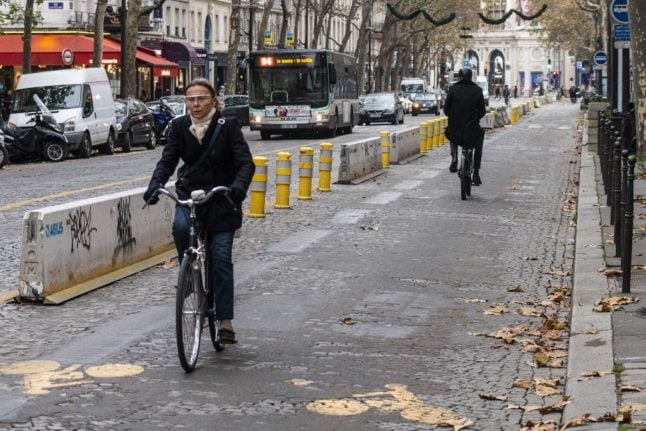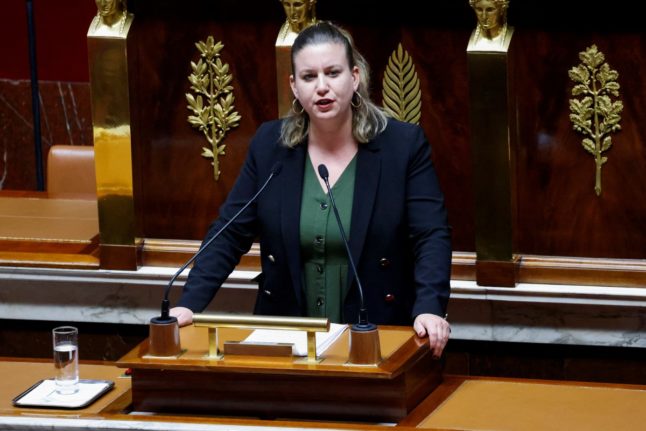French Prime Minister Elisabeth Borne announced a boost to the existing ‘Plan Vélo’ (Bicycle Plan) on Tuesday morning at Matignon, the Prime Minister’s HQ.
Borne specified during her Tuesday address that an additional €250 million will be spent on the project for 2023, marking its fourth anniversary.
The Plan Vélo is a national programme set to encourage bicycling in France building up bike-friendly infrastructure and encouraging people to get on their bikes via education campaigns.
The additional funding will offer municipalities with additional funds to build bike paths and secure parking locations.
Setting aside more money in a single for biking than ever before, the ambitious scheme is a segment of the multi-year Bicycle Plan, falling under the “active mobility fund”, which allows the financing of infrastructure.
The project will be operated in communication with local communities, “to ensure that investments are targeted and effective,” a spokesperson from the Prime Minister’s office told AFP. “[The plan] will be endowed with €250 million euros for 2023; €200 million will be dedicated to infrastructure and €50 million for secured bicycle parking.”
READ MORE: MAP: France to splash out €43 million to build new cycle lanes around the country
On top of the increased budget for the bike plan, the prime minister said that government would also institute an additional “inter-ministerial committee on cycling” to be launched in the autumn, which will meet every six months.
Why now?
While the prime minister’s statement came on the bike plan’s fourth anniversary, for Transport Minister Clément Beaune, the additional funds are particularly important for prioritising bicycles after the government provided assistance for drivers (such as the fuel subsidy) amid rising cost of living.
“At a time when we have supported fuel and the car a lot, it is important to show that we also support other modes of transport,” Clément Beaune, the Minister of Transport told Le Parisien. “We want to make the bike a real means of transport and not just a leisure tool.”
The new funding for the bicycle plan was met with support.
The president of the Federation of Bicycle Users (FUB), Olivier Schneider, told Le Parisien that Tuesday’s announcement was “good news” because “it will allow suburban and rural towns to finally get on board, as they do not have as many resources as large urban areas to finance significant bike lane projects.”
Nevertheless – he hopes that the State will “maintain its budgetary efforts after 2023.”
What does the full plan entail?
Holistically, the multi-year bicycle plan includes several components, not least of which is infrastructure. It allows funds to be set aside for communities across France to implement cycle paths and create safe cycle routes. However, it is also an education campaign.
The plan promotes the “made-in-France” bicycle industry, as well as a the “savoir rouler à vélo” (SRAV) programme that teaches children in primary school how to ride a bike (pedaling, breaking, signs, and good road behaviour). Additionally, it seeks to encourage bicycling from a health standpoint and promotes the construction of bicycle parking during the 2024 Paris Olympic Games.
Originally launched in 2018, at the behest of current Prime Minister Elisabeth Borne, who was the then-Minister of Transport, the national ‘bicycle plan’ established a 350 million fund to span seven years (2018-2025).
READ MORE: How Paris will spend €250 million on making city ‘100 % bike friendly’
Intended to promote the ‘ecological transition,’ as well as health and well-being, the plan was extended and awarded more funds. It is now expected to run through 2027, and by 2025, it will have been budgeted at least 500 million.
The budgets for future years could also be increased, similar to 2023. A spokesperson for the Prime Minister’s office said “The multi-year envelope has yet to be defined, as it will be part of the overall reflection on transport infrastructures, which will be based on what the infrastructure policy council presents this fall.”



 Please whitelist us to continue reading.
Please whitelist us to continue reading.
Member comments